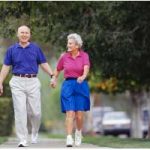The Centers for Disease Control and Prevention estimates nearly 5.1-millions Americans have heart failure. Heart failure is the result of the heart not functioning properly and can lead to death. Aging is a large factor in the function of the heart, so many seniors are at risk for developing it.
 There are many contributing factors aside from aging that can lead to heart failure. Diabetes, high blood pressure, previous heart attack and obesity are just some notable ones.
There are many contributing factors aside from aging that can lead to heart failure. Diabetes, high blood pressure, previous heart attack and obesity are just some notable ones.
With this information in mind, there is one thing that seniors can do to reduce their risk of heart failure by nearly half.
Exercise linked to reduction in heart failure among seniors
By now we know the benefits of exercise to improve overall health. New research suggests seniors who exercise can lower their risk of heart failure by nearly half.
 The latest findings come from the University of Boston where researchers followed 44,000 patients over 65, for 22 years. From the group, 1,380 cases of heart failure were reported. After adjusting the statistics researchers did not find a link between poor diet and risk of heart failure.
The latest findings come from the University of Boston where researchers followed 44,000 patients over 65, for 22 years. From the group, 1,380 cases of heart failure were reported. After adjusting the statistics researchers did not find a link between poor diet and risk of heart failure.
What they did uncover, though, is those who walked faster – three miles an hour as opposed to two – reduced their risk of heart failure by 26 percent. Those who met four or more criteria of good health – not smoking, exercising, having a healthy weight etc. – lowered their risk of heart failure by 45 percent.
Although many heart conditions may be a result of poor diet, researchers believe that in regards to heart failure, there are other factors which can contribute to heart failure more than a poor diet.
The takeaway from the new findings suggests that seniors do not have to do intense physical activity, but something as simple as briskly walking can be enough to improve their odds against heart failure. Furthermore, burning calories from hobbies and home activities – cleaning, gardening etc. – are also effective means of exercise.
One aspect that remains unclear is if practicing healthy habits early on in life will further reduce the risk of heart failure. Researchers noted they were unaware of the health status of participants prior to monitoring them after age 65.
Additional benefits of exercise for seniors
 Not only will exercise help reduce seniors’ risk of heart failure, but it can also provide additional benefits to improve overall health. Although exercise may appear more challenging the older one gets, picking exercises for the individual’s needs can result in maximum results.
Not only will exercise help reduce seniors’ risk of heart failure, but it can also provide additional benefits to improve overall health. Although exercise may appear more challenging the older one gets, picking exercises for the individual’s needs can result in maximum results.- Bone strength – exercise can help reduce bone loss, which contributes to the onset of osteoporosis. Stronger bones also mean a reduction in falls, which can lead to further health consequences.
- Weight management – weight is a contributing factor to many heath risks. Exercise can aid in proper weight management, which can help better manage current health conditions or reduce their onset. Some illnesses include diabetes and hypertension. These conditions can benefit from regular exercise.
- Mood boost – mood and mental health are very important as we age. Seniors may often live alone and become less social and their positive outlook may diminish. Exercise has been shown to help improve sleep along with being a mood-booster.
The key is finding an exercise you most enjoy so you will stick with it. As long as you have clearance from a doctor, exercise is safe.
With such a large variety of exercise available, you’ll sure be able to find something you enjoy that fits your own personal needs. Just because you’re aging doesn’t mean you have to start slowing down. Exercise allows you to continue to enjoy life as you wish.
References:
http://www.helpguide.org/articles/exercise-fitness/exercise-and-fitness-as-you-age.htm
http://www.cdc.gov/dhdsp/data_statistics/fact_sheets/fs_heart_failure.htm
http://www.mayoclinic.org/diseases-conditions/heart-failure/basics/risk-factors/con-20029801
http://news.health.com/2015/07/06/keeping-fit-may-halve-seniors-heart-failure-risk/
http://www.cdc.gov/dhdsp/data_statistics/fact_sheets/fs_heart_failure.htm
http://www.mayoclinic.org/diseases-conditions/heart-failure/basics/risk-factors/con-20029801
http://news.health.com/2015/07/06/keeping-fit-may-halve-seniors-heart-failure-risk/
No comments:
Post a Comment